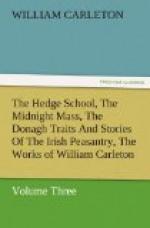“Muttered his prayer to the midnight air,”
would almost impress a man with the belief that it was a meeting of the dead, and that the priest was repeating, like the Gray Friar, his
“Mass of the days that were gone.”
On the ceremony being concluded, the scene, however, was instantly changed: the lights were waved and scattered promiscuously among each other, giving an idea of confusion and hurry that was strongly contrasted with the death-like stillness that prevailed a few minutes before. The gabble and laugh were again heard loud and hearty, and the public and shebeen houses once more became crowded. Many of the young I people made, on these occasions, what is I called “a runaway;” (* Rustic elopement) and other peccadilloes took place, for which the delinquents were “either read out from the altar,” or sent; probably to St. Patrick’s Purgatory at Lough Derg, to do penance. Those who did not choose to stop in the whiskey-houses now hurried home with all speed, to take some sleep before early Mass, which was to be performed the next morning about daybreak. The same number of lights might therefore be seen streaming in different ways over the parish; the married men holding the torches, and leading their wives; bachelors escorting their sweethearts, and not unfrequently extinguishing their flambeaux, that the dependence of the females upon their care and protection might more lovingly call forth their gallantry.
When Mike Reillaghan considered with due attention the hint which Darby More had given him, touching the necessity of collecting his friends as an escort for Peggy Gartland, he had strong reasons to admit its justness and propriety. After Mass he spoke to about two dozen young fellows who joined him, and under their protection Peggy now returned safely to her father’s house.




